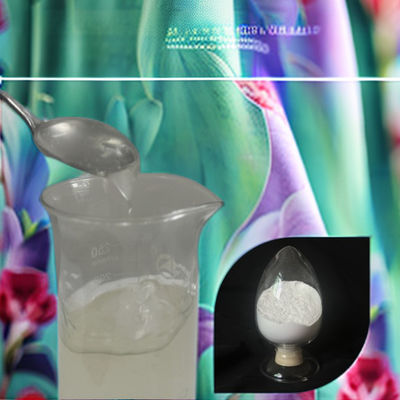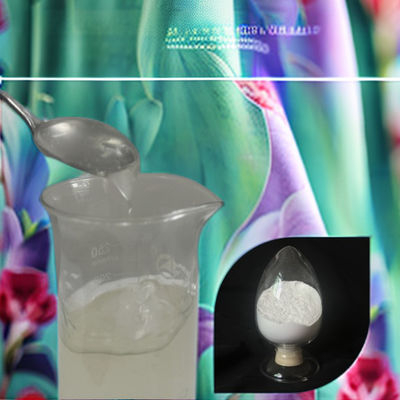Product Description:
Reactive Printing Thickener is a chemical additive specifically formulated for use in the textile industry during reactive dye printing. This thickener is developed to improve the viscosity and rheological characteristics of printing pastes, enabling accurate and effective printing on various fabrics.
Reactive Printing Thickener is carefully designed to provide several key benefits. Firstly, it enhances the viscosity of the printing paste, ensuring better control and stability during the printing process. This results in improved definition and sharpness of the printed designs. Secondly, Reactive Printing Thickener is also capable of improving the transfer rate of printing paste, resulting in a brighter palette of colors. Lastly, this thickener also provides greater shear stability, making it more flexible and resistant to adverse printing conditions.
Features:
Sodium carboxymethyl cellulose aqueous solution is a clear, transparent, homogeneous and stable product. It also has outstanding viscosity and is unaffected by mechanical force, so its properties remain the same regardless of pump cycle or stirring. Sodium carboxymethyl cellulose aqueous solution does not need to be stored in special tanks, and is not reactive with temperature or bacteria, which makes it readily accessible for production at any given moment.
Sodium carboxymethyl cellulose aqueous solution has excellent viscidity and film-forming property. This allows it to form a smooth, wear-resistant and flexible film on the surface of warp, with excellent absolute strength, relative activity and friction perfect for weaving high grade fabric and allowing for high-speed production.
As a result of using sodium carboxymethyl cellulose aqueous solution, yarn is easily dried and glossy, with a soft hand feel. There is no need for chemical treatment or desizing agents with this solution.
The yarn count and fabric that has been processed with sodium carboxymethylcellulose aqueous solution won't become yellowed or mildewed, which reduces the amount of substandard goods with defective spots or greasy dirt, and avoiding damages by worms or rats.
Finally, using cellulose gum instead of starch eliminates the need for a full set of precise machinery and control instrument with complex operations, improving workshop hygiene and making it easier to maintain mechanical equipment, as well as enhancing the production capacity of weaving machine.
Technical Parameters:
Advantages:
Fuxin™ brand textile printing grade CMC has high color yield, fine paste, good shear thinning performance and chemical stability, and good printing effect. It shows good functional effects and cost-effective advantages when proccessing:
- High color yield (10%-20% higher than sodium alginate), which can directly reduce dye consumption costs.
- Good chemical stability, good compatibility with printing and dyeing auxiliaries and dyes, not easy to spoil during storage, no need to add preservatives.
- Chemical stability of color paste is much better than sodium alginate, especially in summer.
- Good water retention and high structural viscosity. It has good shear thinning performance under the action of shear stress, excellent screen penetration performance, uniform printing block surface, high outline definition, and smooth lines.
- It has good solubility and can be quickly dissolved in cold water under stirring conditions, no gum clump, save beating time.
- Easy to wash off and good hand feeling .
- The cost-effectiveness advantage is obvious. Compared with sodium alginate, it can directly reduce the use cost and improve economic benefits.
Performance of Ultra High DS CMC


1st pic:Dyed color granular CMC 2% solution
2nd pic: The left is standard product made in Italy. The middle and right are Fuxin different types of CMC.
Specification
| TYPE |
Degree of Substitution (DS) |
Viscosity
(Brookfield,1%soln.,20℃)
|
pH |
Moisture |
Particle Size |
| 10H |
1 |
2500-3000cps |
6.5-8.5 |
≤15% |
20-70 mesh |
| 13H |
1.3 |
1500-2500cps |
| 15H |
1.5 |
1000-2000cps |
| 18H |
1.8 |
800-1600cps |
| Y002 |
2 |
800-1500cps |
| Y230 |
2.3 |
600-1000cps |
*Kindly contact us for specification and information about any specific grade of CMC other than mentioned in the above table.
Powder or granular available, we recomed customer to purchase the brown granle type CMC to sell as sodium alginate for higher profit.
Technique Process
▲Dissolve the dyes and add into the paste, make the color paste with thickener→▲Printing→▲Drying (100 ℃)→▲Baking or steaming→▲Washing→▲Soaping→▲Rinsing→▲Post treatment procedure.
Dissolution Methods and Proportion:
How to make the paste?
1. The ratio depends on DS level, low DS product should mix with pure sodium alginate to reach a better performance, while ultra high DS product can 100% replace SA.
2. Proportion: same as sodium alginate original paste preparing. Firstly add 65% water, stir the water while adding the product evenly and slowly, then speed up the stirrer for 20-25 minutes. And then add the remaining 35% water, stir for another 20-30 minutes. Leave for 15 minutes.
How to make sure the paste dissove completely?
1. Powder and water completely fuse, not exist solid-liquid separation phenomenon.
2. Paste is dissolved evenly, the surface is smooth, no granular objects.
Applications:
Textile Printing: Reactive Printing Thickener is extensively used in textile printing, particularly for reactive dye-based printing methods. It is employed to thicken the printing paste, allowing for precise and controlled application of dyes onto fabrics. The thickener enhances the viscosity and rheological properties of the paste, ensuring sharp and well-defined printed designs.
Fabric Decoration: Reactive Printing Thickener plays a crucial role in fabric decoration by enabling the creation of vibrant and intricate patterns. It facilitates the bonding of reactive dyes with fabric fibers, resulting in excellent color fastness and resistance to fading. This makes it suitable for a wide range of fabric types, including cotton, rayon, silk, and blends.
Apparel Manufacturing: Reactive Printing Thickener is widely used in the production of printed textiles for apparel manufacturing. It allows for the creation of unique and visually appealing designs on garments, such as t-shirts, dresses, and scarves. The thickener ensures consistent and uniform printing results, enhancing the overall quality and aesthetic appeal of the finished products.
Support and Services:
Reactive Printing Thickener Technical Support and Service
We provide comprehensive technical support and service for our Reactive Printing Thickener products. Our technical team is staffed with experienced professionals who are committed to providing the best solution for your printing thickening needs.
Technical Support
Our technical support representatives are available to answer any questions you might have about our Reactive Printing Thickener products. We provide prompt and accurate assistance to ensure you are getting the most out of your product.
Product Service
We provide service and maintenance for our Reactive Printing Thickener products. Our experienced technicians are available to provide advice on the best installation and usage of the product, as well as any necessary repairs or replacements.
Packing and Shipping:
Packaging and Shipping for Reactive Printing Thickener
Reactive Printing Thickener is usually supplied in drums and containers. The material is packaged in drums with a net weight of 200 kg. The drums are labeled with the product name and a lot number.
The drums must be handled with care to prevent any damage to the material inside. If the drums are damaged, the product must not be used and must be returned to the supplier.
The drums must be stored in a cool, dry place, away from direct sunlight. The temperature should not exceed 25°C.
The drums must be transported in a suitable vehicle, with appropriate safety measures in place. The drums must be secured to prevent them from moving around during transport.

 Your message must be between 20-3,000 characters!
Your message must be between 20-3,000 characters! Please check your E-mail!
Please check your E-mail!  Your message must be between 20-3,000 characters!
Your message must be between 20-3,000 characters! Please check your E-mail!
Please check your E-mail! 



